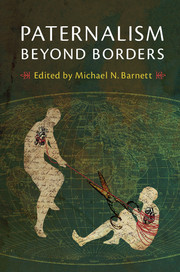Book contents
- Frontmatter
- Contents
- Notes on Contributors
- Acknowledgments
- Introduction: International Paternalism: Framing the Debate
- Part I The Boundaries of Paternalism
- Part II Paternalism, Old and New
- Part III The Social Relations of Paternalism
- 5 Paternalism and Peacebuilding: Capacity, Knowledge, and Resistance in International Intervention
- 6 Enabling or Disabling Paternalism: (In)attention to Gender and Women's Knowledge, Capacity, and Authority in Humanitarian Contexts
- 7 The Limits of Consent: Sex Traffi cking and the Problem of International Paternalism
- 8 Modernity at the Cutting Edge: Human Rights Meets FGM
- 9 Humanitarian Refusals: Palestinian Refugees and Ethnographic Perspectives on Paternalism
- Conclusion: The World According to Paternalism
- Index
8 - Modernity at the Cutting Edge: Human Rights Meets FGM
from Part III - The Social Relations of Paternalism
Published online by Cambridge University Press: 01 December 2016
- Frontmatter
- Contents
- Notes on Contributors
- Acknowledgments
- Introduction: International Paternalism: Framing the Debate
- Part I The Boundaries of Paternalism
- Part II Paternalism, Old and New
- Part III The Social Relations of Paternalism
- 5 Paternalism and Peacebuilding: Capacity, Knowledge, and Resistance in International Intervention
- 6 Enabling or Disabling Paternalism: (In)attention to Gender and Women's Knowledge, Capacity, and Authority in Humanitarian Contexts
- 7 The Limits of Consent: Sex Traffi cking and the Problem of International Paternalism
- 8 Modernity at the Cutting Edge: Human Rights Meets FGM
- 9 Humanitarian Refusals: Palestinian Refugees and Ethnographic Perspectives on Paternalism
- Conclusion: The World According to Paternalism
- Index
Summary
On the face of it, there is no cultural practice that demands international paternalism more than female genital mutilation/cutting (FGM/C). It seems a paradigm case of “hard paternalism” where intervention is justified regardless of the wishes of those undergoing the cutting and those carrying it out. In other words, for all but the most hardened cultural relativists, the practice of cutting the clitorises off pre-pubescent girls in their millions is indefensible. FGM/C trespasses on several deeply held norms treasured by liberals, stimulating the urge to protect the autonomy and integrity of the innocent person threatened by actions deemed barbaric (i.e., based in ignorance and tradition) and therefore the antithesis of the enlightened modern. Recall Gerald Dworkin's influential definition of paternalism, “interference with a person's liberty of action justified by reasons referring exclusively to the welfare, good, happiness, needs, interests or values of the person being coerced.” Could there be a better test case for this sort of paternalism than FGM/C, especially because children are its victims? The quintessential nineteenth-century liberal, John Stuart Mill, acknowledged three exceptions to the restriction on interfering with people's liberty: preventing harm to others, the protection of children, and what he called “backward states of society.” For many abolitionists, FGM/C brings all three of these exceptions together.
But things immediately become more complicated. For a start, intervention in most cases is a three-way relationship: intervener, mother, child. Children are not only the classic targets of paternalistic action, their interests are the grounds for the claims to rightful authority of both interveners and parents. We have, in other words, two competing claimants to the title “legitimate paternalist.” The child does not get to define what her interests are; as with any child, her life up to this point has been one act of paternalism after another. She is already self molded by paternalistic acts – parental and social choices (embedded in socio-cultural norms) made for her on the basis that it's “for her own good.” Now anti-FGM/C activists arrive to trump parental authority in time to prevent an irrevocable act of what's seen as wrongful paternalism, modifying or removing the child's genitalia, taking place.
- Type
- Chapter
- Information
- Paternalism beyond Borders , pp. 256 - 291Publisher: Cambridge University PressPrint publication year: 2016
- 2
- Cited by

